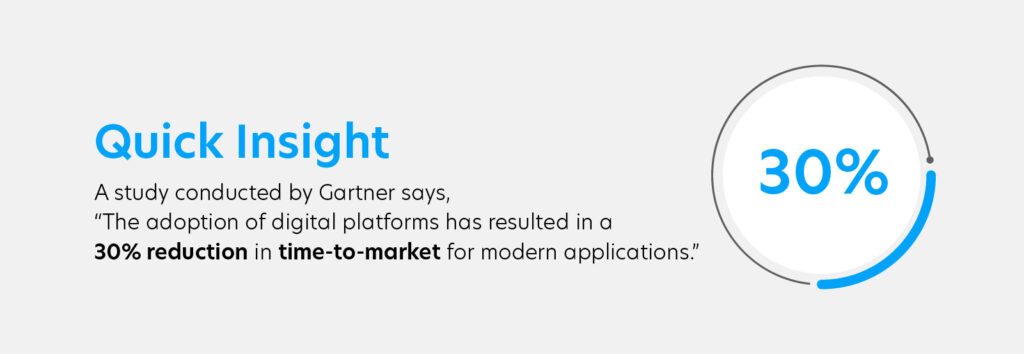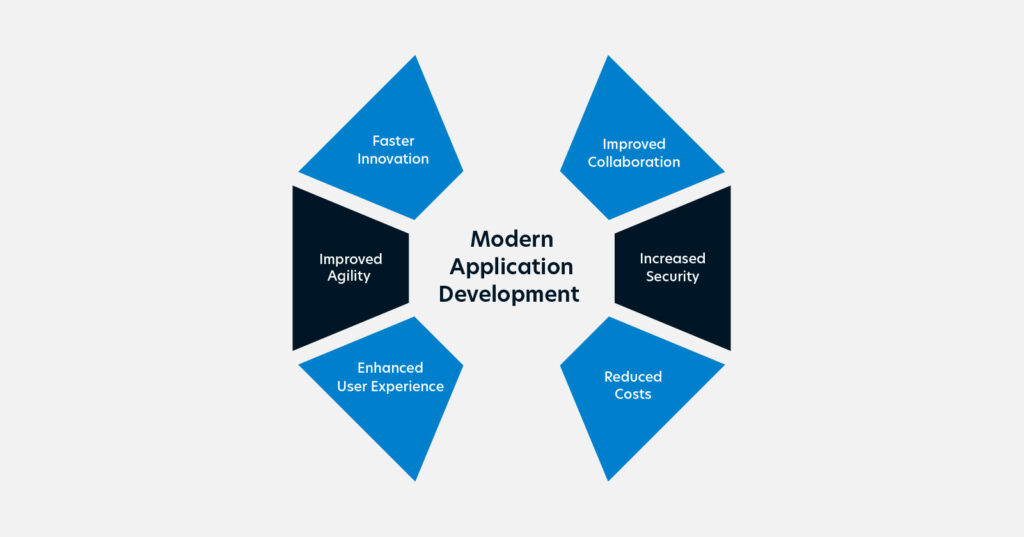CTO Guide: How to Master Modern Application Development Challenges and Achieve Success?
Legacy systems are often considered the backbone of an organization's technology infrastructure.
Read moreBusinesses worldwide are sprinting towards digital transformation, leveraging modern application development to stay ahead in the race. With every passing day, the demand for agile, scalable, and efficient software solutions intensifies. But here’s the catch – traditional development approaches often fall short in meeting these demands, leading to delays, inefficiencies, and missed opportunities.
This is where digital platforms emerge as game-changers revolutionizing modern application development. These platforms offer a comprehensive suite of tools, frameworks, and services that streamline the development lifecycle, empowering businesses to innovate at unprecedented speeds.

But it’s not just about speed; it’s about agility, scalability, and flexibility. Digital platforms enable developers to embrace emerging technologies like artificial intelligence, machine learning, and the Internet of Things seamlessly. With pre-built modules, reusable components, and low-code/no-code capabilities, developers can focus more on crafting unique user experiences and less on mundane coding tasks.
Let’s delve deeper into this blog post and explore the myriad ways on how digital platforms can empower and speed up modern app development.
Modern application development has become imperative in today’s digital landscape, driven by the rapid evolution of technology and business needs. Organizations are increasingly reliant on software solutions that not only meet current demands but also adapt swiftly to future challenges. Traditional development methods often struggle to keep pace with these requirements, leading to inefficiencies and missed opportunities. Here’s why modern application development is crucial:

This transformation is not just about adopting new technologies; it involves a cultural shift within the organization, prioritizing agility, customer-centricity, and innovation. Retailers leverage digital tools to create seamless omnichannel experiences, allowing customers to interact with brands across multiple platforms—whether online or in-store.
The technology landscape is continually evolving, with new tools, frameworks, and methodologies emerging at a rapid pace. Businesses must adapt quickly to leverage these advancements and maintain a competitive edge. Modern application development embraces these technologies, enabling organizations to innovate and stay ahead of the curve.
Challenge: Keeping up with the constant stream of new technologies and integrating them into existing systems can be overwhelming for development teams.
Modern applications are expected to provide seamless, intuitive, and engaging user experiences. With user expectations constantly rising, businesses must deliver high-quality applications that meet these demands.
Challenge: Achieving a superior user experience requires a deep understanding of user behavior and preferences, and the ability to implement design changes quickly and effectively.
In today’s fast-paced market, businesses need to respond swiftly to changing customer needs and market conditions. Modern application development methodologies, such as Agile and DevOps, promote flexibility and rapid iteration, allowing organizations to adapt quickly.
Challenge: Traditional development processes are often rigid and slow, making it difficult to implement changes rapidly and efficiently.
As businesses grow, their applications must scale to accommodate increased workloads and user demands. Modern application development leverages cloud-native architectures and microservices to ensure scalability and performance.
Challenge: Scaling traditional applications can be complex and costly, often requiring significant infrastructure investments and architectural changes.
With the increasing frequency of cyber threats, ensuring the security and compliance of applications is paramount. Modern application development incorporates security practices throughout the development lifecycle, from design to deployment.
Challenge: Traditional development approaches often treat security as an afterthought, leading to vulnerabilities and compliance issues.
Modern application development promotes collaboration across teams and disciplines, breaking down silos and fostering a culture of shared responsibility. This collaborative approach leads to faster problem-solving and more innovative solutions.
Challenge: Traditional development environments can be fragmented and siloed, hindering effective collaboration and communication among team members.
Digital platforms are comprehensive, integrated environments that provide a suite of tools, services, and frameworks designed to streamline application development, deployment, and management. These platforms cater to various aspects of the development lifecycle, from coding and testing to deployment and scaling. They offer pre-built components, reusable code, and automated processes that significantly reduce the complexity and time required for modern application development.

By leveraging the capabilities of digital platforms, organizations can address common challenges associated with modern app development, such as rapid changes in requirements, shorter release cycles, and the need for continuous integration and deployment.
The future of digital platforms in modern application development looks promising, with several trends set to shape the landscape:
The journey through the landscape of cloud application development has been nothing short of exhilarating. Digital platforms are revolutionizing the way businesses operate, with a staggering 87% of organizations adopting digital platforms to drive innovation and growth. This shift has not only streamlined processes but has also enhanced customer experiences, leading to a 56% increase in customer satisfaction rates.
The rapid pace of technological advancement means that those who fail to embrace digital platforms risk falling behind their competitors. Amidst this whirlwind of transformation, Quinnox emerges as a beacon of innovation and reliability with offering of our intelligent application management platform Qinfinite.
By leveraging advanced automation, AI-driven insights, and a robust integration framework, Qinfinite enables organizations to accelerate their application development cycles while maintaining high standards of quality and performance. Its user-friendly interface facilitates real-time monitoring and analytics, allowing teams to identify issues proactively and optimize resource allocation. Additionally, Qinfinite’s ability to integrate seamlessly with existing tools and systems fosters greater synergy across development, operations, and support teams, ultimately driving innovation and reducing time-to-market.
Curious to learn more about AI-powered Qinfinite and explore the power of our modern application development services? Connect with Us Today!
Want to know more about CX? Read interesting blogs below!
Legacy systems are often considered the backbone of an organization's technology infrastructure.
Read moreIn recent years, with the advent of emerging technologies such as cloud, AI/ML, IoT, data analytics, etc., the IT landscape has undergone a drastic transformation. These are top 7 approaches to break the legacy conundrum
Read moreBy embracing AI technologies and solutions with code at scale, companies can unlock new revenue streams which trigger an AI-driven impact economy
Read moreGet in touch with Quinnox Inc to understand how we can accelerate success for you.